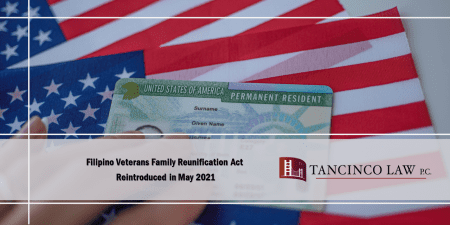First off, this section 245i applies only to those with approved family or employment petitions whose priority dates are current, and are present in the United States in unlawful status.
How can they obtain their green card without having to leave the United States? Can they adjust their status in the United States applying 245i?
Mary, a Filipino national, entered the United States in December 2000 as a crew-member D visa. She boarded the ship going to the U.S. but eventually she jumped ship upon advice of her U.S. citizen sister who filed a petition for her in March 2001. When the petition of her sister was approved, she was told that she has to wait for more than 20 years before the visa will become available. Mary fell out of status and tried to find ways to obtain legal status.
In 2007, a U.S. employer hired her as a caregiver. She worked for a health care facility and a petition was filed on her behalf. The petition was denied because the petitioner, who filed for bankruptcy in 2008 cannot show proof of ability to pay her salary. Mary suffered depression but recovered. She now is working again as a caregiver.
Recently, she noticed that her sister’s visa petition’s priority date of 2001 is now current. She has been in unlawful status for 20 years and is wondering if she can still get her green card in the United States. Another concern that she has is Trump’s Suspension of Immigration for family based preference petitions which would cover the petition filed by her sister.
What can Mary do?
Section 245(i)
The nation’s immigration law had been remarkably amended during the Clinton Administration. But it was also under President Clinton’s time that thousands of immigrants who were in unlawful presence were able to obtain legal status when he enacted section 245i of the Immigration and Nationality Act.
INA §245(i) allows certain persons to apply for adjustment of status notwithstanding the fact that they entered without inspection, overstayed, or worked without authorization. A person who is not generally allowed to adjust status may do so if s/he is grandfathered under §245(i) provided that: (1) s/he is the beneficiary of a labor certification or visa petition under section 204 (including I-140, I-130, I-360, I-526) that was filed on or before Jan. 14, 1998; or (2) s/he is the beneficiary of a labor certification or visa petition that was filed after Jan. 14, 1998 but on or before Apr. 30, 2001, and he or she was physically present in the U.S. on Dec. 21, 2000.
To be grandfathered, an immigrant visa petition or labor certification application on or before Apr. 30, 2001 had to be: (1) timely filed; (2) the application had to be “approvable when filed” which is defined as (i) properly filed; (ii) meritorious in fact; and (iii) nonfrivolous.
Those who meet the eligibility requirements even if they are in unlawful status and are generally barred from filing adjustment of status under Section 245A and 245(c) may use this specific provision to obtain the green card.
Those who have immediate relatives (U.S. citizens on behalf of spouses, minor children and parents) as their petitioners may not need 245i to adjust their status because unlawful presence is waived for immediate relatives. This 245i applies mostly to family and employment based preference categories (eg. 1st, 2nd, 3rd and 4th categories).
Since there were numerous unlawfully present individuals who filed visa petitions under the Clinton administration (to take advantage of the 245i provision), and their priority dates of 2001 are now current in 2020, section 245i may allow them now to adjust their status. After 20 years, they can now finally adjust to get their green card.
In the case of Mary, since the petition was filed before April 30, 2001, the priority is now current based on the July 2020 visa bulletin, she will qualify under 245i to obtain her green card in the United States. The Trump Suspension of Immigration will not affect those who are present in the United States, hence, Mary may still file for her adjustment of status.
(Lourdes Santos Tancinco, Esq is a partner at the Tancinco Law Offices, a Professional Law Corp. Her office is located at One Hallidie Plaza, Ste 818, San Francisco CA 94102 and may be reached at 1-888-930-0808; email at law@tancinco.com, www.facebook.com/tancincolaw or check their website at tancinco.weareph.com/old.)


